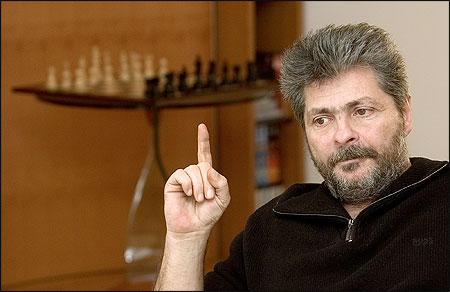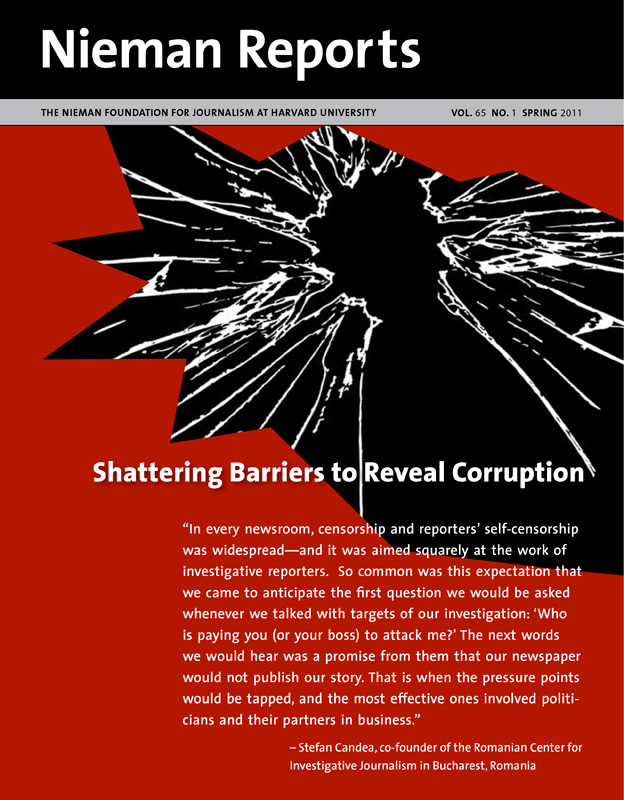
Romanian businessman Sorin Ovidiu Vintu has a simple strategy for dealing with journalists: “I don’t want to do any business with them,” he said. “I just want to buy them out.” Photo by Vadim Ghirda/The Associated Press.
"I need an organization to respond to my orders like the Audi I own. I turn the key; it starts. I turn the key back to the left; it stops."—Sorin Ovidiu Vintu
RELATED ARTICLE
“Abandoning a Broken Model of Journalism”
- Stefan Candea Sorin Ovidiu Vintu is a leading Romanian media mogul, and these are words he spoke in a phone call to one of his top managers. He and his media empire are emblematic of the practices and perspective of the mainstream media in Romania. As a power broker, Vintu considers his media business to be a military weapon and views his journalists as embedded within his troops.
He is a controversial self-defined "financial speculator" whose strategy is to build a media empire to gain power and protection. In the 1980's he served a four-year jail sentence for business crimes. More recently he was convicted of a crime related to his involvement with a bank that is connected with Fondul National de Investitii ("National Investment Fund"), an investment fund that turned out to be a Ponzi scheme that left about 300,000 Romanians without the money they had invested.
RELATED ARTICLE
“Establishing the Romanian Center for Investigative Journalism”
- Stefan CandeaVintu started his media empire in 2003. What money he used is unknown since he operates his companies through offshore structures and proxies. He has incurred losses approaching $100 million. But in his quest to buy as much media and as many journalists as possible, he is willing to overpay for acquisitions and salaries.
When his media operation was at its peak, it included several TV and radio stations, newspapers, weeklies, magazines, online platforms, publishing houses, and print media distribution companies. From news to satire, from finance to fishing, his media empire covered everything. He also controlled a polling institute, which was quoted by his media group. He hired seven high-profile union leaders in industries unrelated to media to sit on his media company's board. He also invested in a network of digital signage from which he distributed editorial content in the Bucharest international airport, subway stations, and supermarkets. He announced that he had expanded into Moldova, Serbia, Hungary and Greece and opened a signage company in Paris. His flagship media outlet is Realitatea TV.
Vintu also established a media foundation in Brussels that portrayed itself as standing for excellence in journalism and education. One of the managers at the foundation was also being paid by the government to represent the Romanian Chamber of Deputies at the European Union. This foundation developed a close partnership with the International Federation of Journalists (IFJ), which is the world's largest organization of journalists with more than 600,000 members in 100 countries. It donated about $250,000 to IFJ's Safety Fund and IFJ's ethical journalism program, created a journalism award, and the local representative of Vintu Foundation has, at times, represented IFJ at joint events with the European Anti-Fraud Office.
Late in 2010, Vintu was arrested and held in jail for nine days before being released to await trial. The charges involve help he gave a former business partner in escaping an international arrest warrant. As prosecutors were developing their case, they wiretapped his phones so that when this case got into the courtroom, transcripts from these phone conversations were leaked to the press. They show just how deeply engaged he was in directing his entire media group to influence the presidential election in 2009. His goal was to overturn the president then in office and replace him with one of his friends.
In numerous recorded conversations with top politicians and leading journalists, Vintu is heard bragging about his "war" with the president and describing how he uses his media empire to change people's minds. He acknowledges on several occasions that he doesn't care if the stories that his media broadcast are not true; they only need to serve his business interests.
Embedded Journalists
For such a propaganda machine to work, it needs to build credibility and have an army of journalists willing to work under such conditions. Vintu bought credible news outlets and enforced this kind of discipline by surrounding himself with often well-known journalists whom he could manipulate. During the election year of 2009, a person who had been the director of Radio Free Europe during the Ceausescu dictatorship and a director of Radio Deutsche Welle in the 1990's ran Vintu's company, Realitatea-Catavencu Group.
In wiretapped conversations, Vintu spoke in military terms about his media war with the president: "I pulled out of the barracks my regular army …" he said, referring to his stable of reporters. He also described his strategy of collecting journalists when he was speaking with a top media manager about two Romanian bloggers. "I don't want to do any business with them. I just want to buy them out … I can give them a bribe and that's it. And they join our troops. It is a technique to attract people next to you."
Unfortunately, what these recordings reveal is actually business as usual at major media outlets in Romania. Vintu might be more powerful than a lot of other media owners, but how he conducts his business dealings does not set him apart. What is so difficult for me to absorb are the compromises—in practice and principle—that too many journalists who work for such people are evidently willing to accept.
Stefan Candea, a 2011 Nieman Fellow, is a freelance journalist and co-founder of the Romanian Center for Investigative Journalism in Bucharest, Romania. He teaches investigative journalism at Bucharest University, and he is a member of the International Consortium of Investigative Journalists and a correspondent for Reporters sans Frontieres in Romania.



